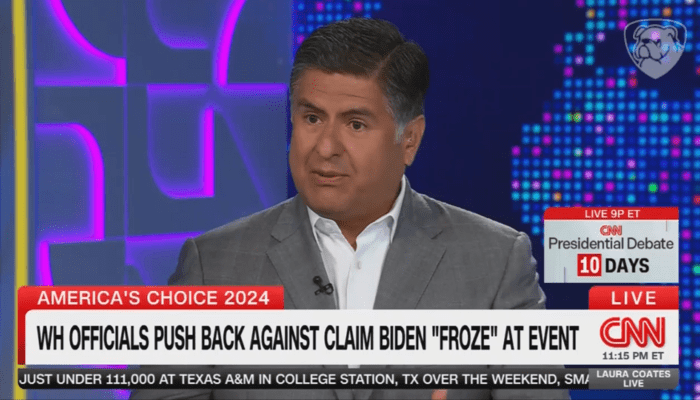This Monday, Jim Acosta’s temporary seat filling for Laura Coates Live did anything but cool down as a fiery discussion unfolded concerning President Biden’s alleged cognitive decline. Situated at the heart of the debate was Bryan Lanza, Trump’s 2016 campaign former Deputy Communications Director who accused the network of “selective editing” and biased reporting during Trump’s Japan visit.
The engagement surged when Acosta aired a clip of Trump mistakenly uttering “Dr. Ronny Johnson” rather than “Dr. Ronny Jackson” at a Detroit event. Predictably, Acosta aimed to equate Trump’s minor faux pas with Biden’s repeated blunders. Lanza’s response, however, was swift in his defense, stressing that Biden’s multiple conversational slips were indicative of cognitive decline, not just typical speech errors. Lanza emphasized Biden’s seemingly frequent navigational confusion at public appearances, an alarming issue that goes beyond mere memory muddle.
Lanza’s argument did not end there. Denying the alleged decline is not only dishonest, Lanza contended, but it’s dangerous as well. The dismissiveness of Acosta at the mention of Biden’s diminishing cognitive state by drawing parallels to Trump indicating his potentially biased stance. To Acosta’s query on Trump’s cognitive state, Lanza affirmed in no uncertain terms that Trump doesn’t struggle with something as basic as door finding or needing help to exit the stage.
In Biden’s defense, Ashley Allison, National Coalitions Director for the 2020 Biden-Harris Campaign, justified Biden’s delayed stage exits. She claimed Biden’s late departure at a recent event was not due to confusion but a characteristic delay he’s known for, unlike punctuality-fanatic Obama.
Lanza’s rebuttal was pointed. This wasn’t a singular occasion, he claimed; rather it is a persistent pattern throughout Biden’s administration tenure where he often appears disoriented, needing direction for something as simple as a door. Acosta’s response, of course, was to accuse these footages as “deceptively edited.”
Lanza further highlighted media bias by citing the incident of Trump feeding koi fish during a Japan visit. The then-President had merely followed the lead of the late Japanese Prime Minister Shinzo Abe, but the media unfairly amplified a non-issue, labeling Trump’s action as “disrespectful.”
As the verbal volleying neared its end, Allison proposed a truce. However, this fiery debate not only underlined the polarizing political commentary but raised questions about objective journalism.
In summation, this fiery debate mirrors both political and media biases – while it raised genuine concerns about President Biden’s potential cognitive decline, it also exposed media biases and the prominence of “selective editing.” In the search for truth, this fierce exchange asks us to question – are we blinded by biases, or are we willing to perceive the unvarnished reality?



